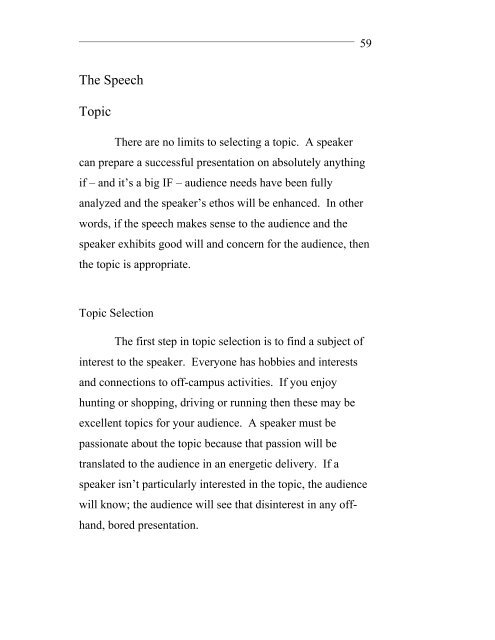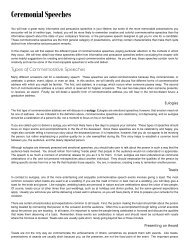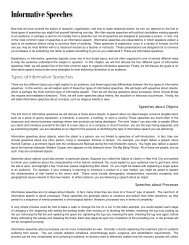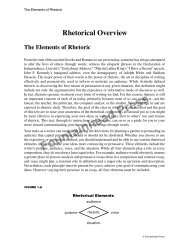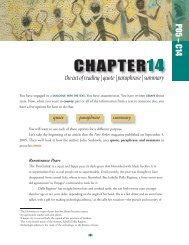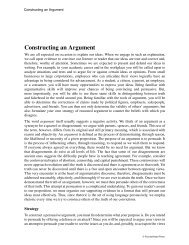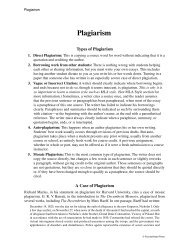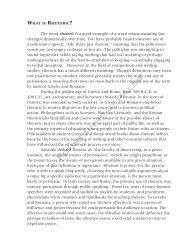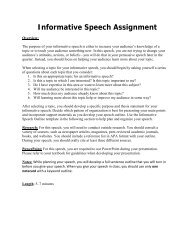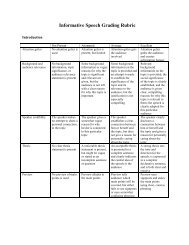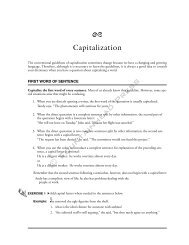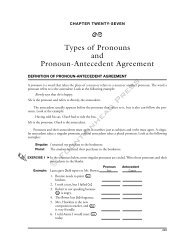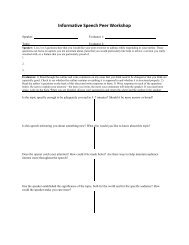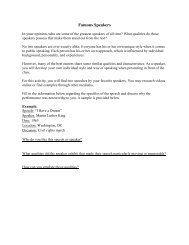The Speech Topic - Fountainhead Press
The Speech Topic - Fountainhead Press
The Speech Topic - Fountainhead Press
You also want an ePaper? Increase the reach of your titles
YUMPU automatically turns print PDFs into web optimized ePapers that Google loves.
59<strong>The</strong> <strong>Speech</strong><strong>Topic</strong><strong>The</strong>re are no limits to selecting a topic. A speakercan prepare a successful presentation on absolutely anythingif – and it’s a big IF – audience needs have been fullyanalyzed and the speaker’s ethos will be enhanced. In otherwords, if the speech makes sense to the audience and thespeaker exhibits good will and concern for the audience, thenthe topic is appropriate.<strong>Topic</strong> Selection<strong>The</strong> first step in topic selection is to find a subject ofinterest to the speaker. Everyone has hobbies and interestsand connections to off-campus activities. If you enjoyhunting or shopping, driving or running then these may beexcellent topics for your audience. A speaker must bepassionate about the topic because that passion will betranslated to the audience in an energetic delivery. If aspeaker isn’t particularly interested in the topic, the audiencewill know; the audience will see that disinterest in any offhand,bored presentation.
60<strong>The</strong> second step is to find out some backgroundinformation that will increase your expertise. You alreadyknow something about the topic. However, you are not arecognized expert and your opinion is no more credible thanany other college student. It’s time to do some generalreading to find out what sorts of general information isavailable to flesh out your basic knowledge. <strong>The</strong> best way todo this initial search is to state your topic as a question. Bylooking for answers to the question, you’ll focus the topicand spend a lot less time researching. For example, if youwish to speak about a gasoline crisis, then the research topiccould be stated as: How are college students affected by therising cost of gasoline? This limits your topic nicely. Youknow that gasoline prices are going up because you both paymore at the pump and you’ve been watching the news. Butwhy are the prices going up? How high might they go thissemester? This year? Are they going up so high that it willcut into the ability of college students to buy books? Paytuition?Without stating the topic as a question, it may lackfocus. For example: My topic is about gas prices going up.What’s the focus? Who’s your audience? Why is this anissue? As a statement, there’s nothing to work with andyou’ll spend far too much time doing unfocused, and
61eventually unusable, research. Spend your time wisely andthink through exactly what you want to discuss before youbegin doing research. In fact, make notes to yourself bywriting down your research question, think through how youraudience will be affected, and where you might want to lookfor information.In order to demonstrate good will toward theaudience, part of the topic selection process is to determinewhat the audience needs to know. Audience analysis kicks infrom the very earliest stages of the selection process.• Is it likely that my audience members are going to beaware of my topic?• Will they care?• How are they going to be affected?Writing out the answers to these questions also helps focusthe research question and takes most of the work out ofsearching for background materials. Once the speaker has agood idea of how the audience should react to the topic andhow the topic can meet audience needs, it’s time to do thebackground research.Some specific guidelines to assist in selecting a goodtopic might include a topic that is:• Meaningful and important to your audience• Important and interesting to you personally• Tailored to your particular audience so that it isrelevant to their interests
62• Something about which you already have someknowledge• Researchable• Limited so that you can learn enough to make aresponsible presentation• Appropriate for the time, place and occasion of thespeechResearchFinding information on your topic using sources otherthan your own opinion and experience is called research.Research involves time and energy spent reading, listening,thinking, and writing. IT CANNOT BE DONE AT THELAST MINUTE AND THERE ARE NO SHORTCUTS.Speakers should look for information from credible mediasources, online databases, reputable journals and magazines,and interviews with experts. On campus, the universitylibrary provides books, periodicals (serials), newspapers,electronic databases, and reference professionals to help youfind just the information you need.A good speech uses a mix of reference materials froma variety of media, and the speaker includes informationabout the author or the publication so that the presentationhas a balanced approach. <strong>The</strong> audience must be aware of anybias or credibility issue with the editorial view. For example,
63a pro-hunting speech using online resources only from theN.R.A. (National Rifle Association) will be unbalanced andpromote only the views of a biased organization. This doesnot mean that the organization’s views are wrong. It doesmean that the views represent only one side of an argumentand must be balanced with references from other sourcesreflecting other views.<strong>The</strong> speaker should gather far more information thatwill be used in the speech so that they are truly expert in thetopic area. This technique is called the iceberg theory ofresearch and it serves two purposes: one, you have plenty ofinformation available to add to the speech if it comes upsomewhat short, and two, you can “pull” information out ofyour head that you remember from your research if you“blank out” during the presentation. A speaker who gathersonly enough information to create a minimum expectationspeech will be in real trouble if the speech doesn’t quitestretch to the time limit, or they forget what they meant to sayand their only option is to repeat what they’ve already shared.When doing research, refer to your research questionfrequently, asking yourself, “Is this information relevant toanswering the question?” You will run across quite a bit ofinteresting material, but not everything will meet the needs ofyour speech. Try not to be distracted by gripping narratives,
64stunning examples, and fascinating data that simply do not fityour topic. You will have to look at five or six or twelve orthirty sources to get the answers to your research questionbecause there will be no one source that has the magicanswer. If, for some reason, you do run across a singlesource that has all the answers, you will need to findadditional, corroborating sources. A single source speech issimply a report about that source. Your task is to synthesizematerial from a variety of sources to prove your contentionsand create a unique perspective in your presentation.Source CredibilityNot all research sources are created equal. Anyonecan write a book, so it’s important to know something aboutthe author. Any organization with some money can publish amagazine, so it’s important to know something about thepublisher. Anyone, including your twelve-year-old neighbor,can mount a website that looks professional and be easilynavigated, so it’s important to find out who owns and/orsponsors the website.<strong>The</strong> best course of action is to stick with journalspublished by professional organizations, material fromdatabases owned by the university library, and establishedmedia outlets such as credible news magazines, and online
65news outlets such as the New York Times or CNN.COM.Oddly enough, the National Enquirer tabloid is about 60%credible news from wire service sources, but the publicationitself is not held in high esteem within the news gatheringprofession.When using web-based sources, always go to thehome page and find out everything possible about the authorand the sponsoring organization. Go back out to the web anddo a search on both the author and the sponsoringorganization. <strong>The</strong> more you know about your sources, thegreater your credibility as a speaker because you will be ableto inform the audience about the quality of your information.And remember that a significant part of your speech isbuilding in references to your research sources, so it’s timewell spent.SupportUsing research effectively in your speech is calledsupport. Information from magazines, books, newspapers,interviews, and online searches all contribute to helping youprove the truth of your conclusions. <strong>The</strong>re are all types ofsupport materials including facts, statistics, narratives,examples, and testimony. You will want to choose the best
66type of support for your topic and the type of speech you aregiving.For example, if you want us to feel some emotion,then a narrative would be a good choice. Narratives arestories. <strong>The</strong>y are true stories with a beginning, a middle, andan end that illustrate the importance of the point you wish tomake or include a human dimension that otherwise would bemissing. Human beings love stories. We tell stories all day,every day. We interpret what happened to us at work whenwe are asked how the day went. <strong>The</strong>se are not factual recitalsbut edited versions of what is important to us. <strong>The</strong> speakerwill find a story while doing research that moves forward thetopic while engaging emotion. <strong>The</strong> story is never quotedwhich would force the speaker to break eye contact or recitefrom memory but is re-interpreted so that the speaker istelling his or her version of the narrative with all duereference to the original source.Examples illustrate concepts or conclusions orbehaviors that might not be envisioned in exactly the sameway by all members of the audience. Well-written researchmaterials are often full of examples, so all the speaker has todo is find one that meets his or her needs, reference thesource in the speech, and share the example. Try to avoidhypothetical examples simply because examples from
68speech. In other words, if a speaker is using lay testimony toillustrate what life is like in the Lower Ninth Ward, theaudience must be made aware that this is the opinion of a layperson; opinion should never be confused with experttestimony. Opinions are conclusions drawn by individualswithout benefit of reasoned discussion, research, or anyanalysis. Opinions are closely related to attitudes.Expert testimony involves official spokespersonssharing information that is based on verifiable research,group consensus, scientific experimentation, and otherquantifiable data. An engineering expert might testify thatgovernment resources are focused on shoring up the leveesand cleaning up the streets; that work is being done in theLower Ninth Ward but it is not directly related to helping anindividual homeowner get back into their home. Notice thatthe expert testimony is less likely to evoke an emotionalconnection with the audience even though it may have morereasoning and evidence behind it. When using experttestimony as source material in a speech, it is VERYimportant to include the titles and job descriptions of thoseyou are citing as expert. <strong>The</strong> audience must be able to decidewhether the testimony is truly expert by hearing whether itcame from the Governor or the police chief or the head ofpublic works.
69Facts and statistics describe a class of researchinformation that uses concrete information and numbers todescribe actions and thoughts. This information, expresseddescriptively or in numerical form, means absolutely nothinguntil it is interpreted by the researcher and compared to other,related information and numbers. It is important to have thissort of definitive factual research in the speech but beware ofjust listing facts or numbers without providing interpretation.A speaker who provides one large number after anotherwithout any context is assuming that the audience isremembering the numbers and figuring out what they meanjust as quickly as the speech is delivered. That just doesn’thappen with the average audience. Additionally, a speakerwho simply lists historic events without describing theirrelationship to the audience and each other is not reallygiving a speech; they are just sharing a list. Facts andstatistics are best used to illustrate larger issues; best used asexamples or as a means to illustrate a trend, not as standaloneproof.Over 2,500 years ago, Aristotle decided that there arethree main forms of proof in deliberative speaking: ethos(speaker credibility), pathos (emotion), and logos(reasoning). He wrote at length about the importance ofreasoning but concluded that most listeners are persuaded by
70rhetoric using pathos; that we rely on our emotions to makedecisions and judge credibility. A wise speaker will usetestimony sparingly and carefully to arouse emotion.Without some narrative and testimony, a good presentationmay not as be effective if the audience cannot see the humanface within the topic.


